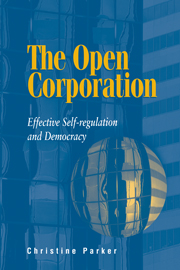Book contents
- Frontmatter
- Contents
- List of tables and figures
- Preface
- Acknowledgements
- 1 Introduction: Corporate self-regulation in the new regulatory State
- 2 The potential for self-regulation
- 3 Motivating top-management commitment to self-regulation
- 4 Cultivating self-regulation leadership
- 5 Self-regulation methodology and social harmony
- 6 The pathologies of self-regulation
- 7 Model corporate Citizens: The role of self-regulation Professionals
- 8 The three strategies of ‘permeability’ in the open Corporation
- 9 Meta-regulation: The regulation of self-regulation
- 10 Conclusion
- Appendix: Methodology
- Notes
- Reference
- Index
Appendix: Methodology
Published online by Cambridge University Press: 05 July 2014
- Frontmatter
- Contents
- List of tables and figures
- Preface
- Acknowledgements
- 1 Introduction: Corporate self-regulation in the new regulatory State
- 2 The potential for self-regulation
- 3 Motivating top-management commitment to self-regulation
- 4 Cultivating self-regulation leadership
- 5 Self-regulation methodology and social harmony
- 6 The pathologies of self-regulation
- 7 Model corporate Citizens: The role of self-regulation Professionals
- 8 The three strategies of ‘permeability’ in the open Corporation
- 9 Meta-regulation: The regulation of self-regulation
- 10 Conclusion
- Appendix: Methodology
- Notes
- Reference
- Index
Summary
The primary empirical research conducted for this book was via unstructured, in depth interviews with regulators and self-regulation professionals in four regulatory areas in which corporate compliance Systems are common: sexual harassment, consumer protection and antitrust, financial Services, and environment. Interviews were conducted with Equal Employment Opportunity (EEO) officers, compliance professionals and regulators in relation to sexual harassment and trade practices, in Australia only. Interviews were conducted with environmental managers and financial Services compliance managers and regulators in Australia, England, Germany, Switzerland and the USA. The primary research is also based on extensive participation in and observation of the activities of the Association for Compliance Professionals of Australia (ACPA) over a period of four years and secondary materials on self-regulation practice, including other scholars' research and written materials produced by self-regulation professionals in Australia, Europe and the USA.
Sampling for interviews
In each case the self-regulation practitioners were chosen by asking regulators for their opinions on the leading self-regulation practitioners and ‘best practice’ self-regulation programs in their area. I also used scholarly and popular literature to identify examples of companies that were likely to exhibit best practice in their compliance or self-regulation System in each particular regulatory area. Self-regulation practitioners were also asked to suggest potential interviewees who would fit the best practice criteria. The sample was therefore based upon both an objective choice from the broad sweep of literature and regulators' data, and a purposive snowball methodology in which interviewees were asked to suggest others (Minichiello et al. 1990:198).
- Type
- Chapter
- Information
- The Open CorporationEffective Self-regulation and Democracy, pp. 302 - 311Publisher: Cambridge University PressPrint publication year: 2002



